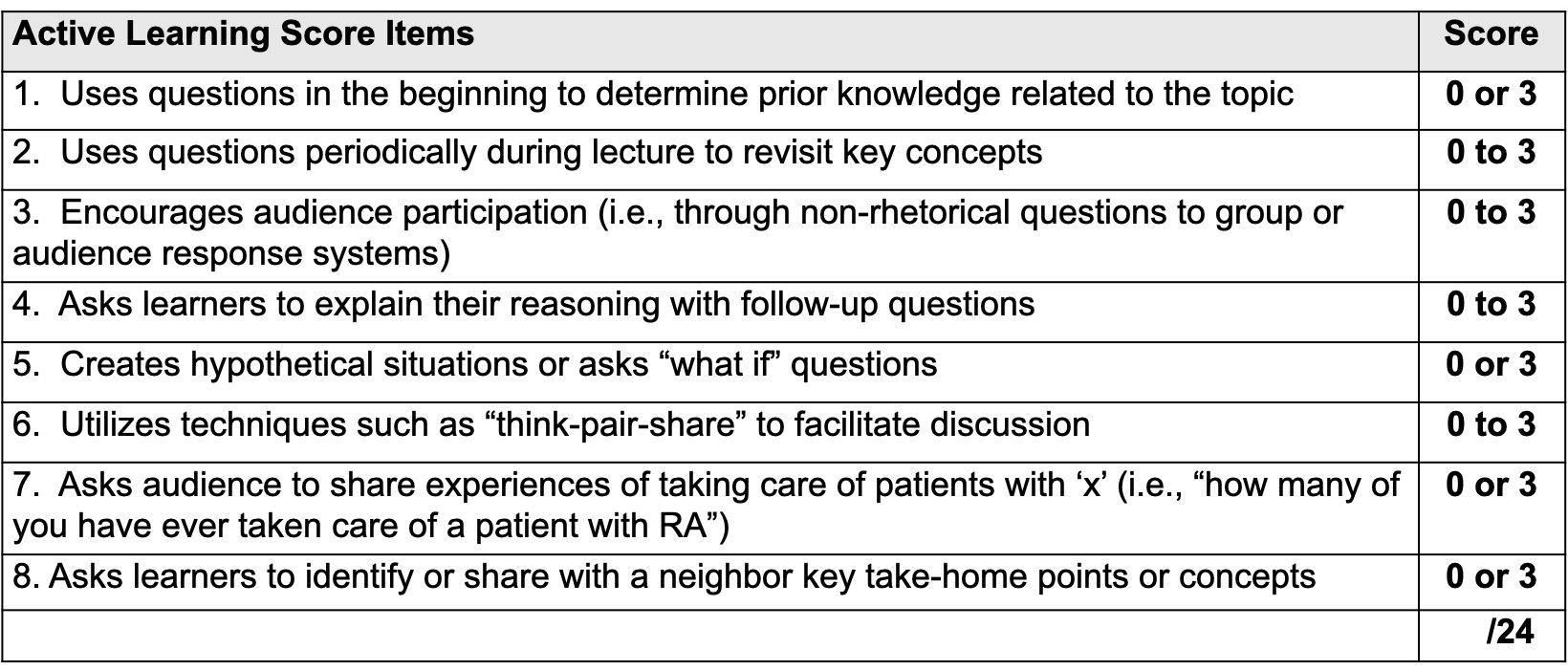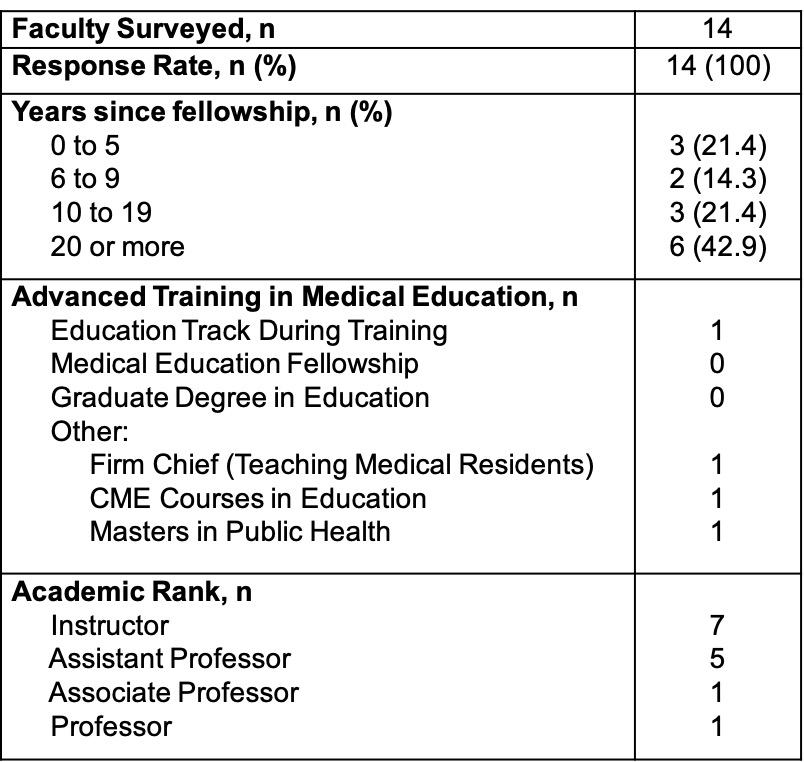Session Information
Session Type: Abstract Session
Session Time: 10:00AM-10:50AM
Background/Purpose: The science of learning has provided us with evidence-based tools to enhance learning. Studies show that greater learning occurs in interactive workshops that tackle real-life problems, as compared to traditional lectures. We sought to determine the use of active learning techniques during fellowship didactics and to assess faculty knowledge regarding active teaching strategies.
Methods: We assessed faculty use of active learning strategies during the “Introduction to Rheumatology” curriculum by using a cognitive learning assessment tool that was created by Saunders S and Freed JA (manuscript in progress). An “Active Learning Score” was calculated based on questions that measured active learning (Table 1). A pair of observers (JSH, VCK, or SDW) scored each of the lectures, which took place from July to September 2019. We surveyed faculty knowledge and behavior regarding current teaching practices. Unprecedented teaching challenges brought on by the COVID-19 pandemic prompted us to survey faculty comfort teaching within a virtual learning environment. This project was determined to be exempt by the Beth Israel Deaconess Medical Center IRB.
Results: We surveyed 14 faculty members within the Division of Rheumatology. Faculty demographics are shown in Table 2. Faculty placed the highest value on “understanding concepts” and “applying information to new cases” as opposed to “remembering facts.” A minority of faculty (42.9%) were familiar with the concept of a flipped classroom. Only 50% of faculty felt that virtual teaching could be as effective as in-classroom teaching.
A total of 12 faculty members delivered 16 lectures on core rheumatology topics. 93.8% of lectures incorporated case-based examples that fellows could relate to. Mean baseline Active Learning Scores were 7.8 +/- 5.3 out of 24. We had strong agreement between raters as measured by intraclass correlation (0.86, 95% CI: 0.64-0.95). Faculty asked learners to explain their reasoning with follow up questions an average of 1.25 +/- 1.14 times per lecture. Techniques to facilitate small-group discussion, such as “think-pair-share,” were used in 1 out of the 16 lectures (6.25%). Learners were asked to identify or share key take-home points or concepts in 1 out of 16 (6.25%) lectures.
Conclusion: Faculty use of active teaching techniques in fellowship didactics was low. A minority of faculty were familiar with the flipped classroom, and the majority of faculty expressed hesitancy regarding teaching in a virtual environment. Based on these results, we plan to use a multifaceted approach to improve the use of active teaching strategies in the “Introduction to Rheumatology” curriculum (Figure 1). We designed a faculty development workshop to provide strategies for increasing active learning in a virtual environment and will seek input from the department regarding how best to implement these educational changes. We will compare Active Learning Scores pre- versus post-intervention.
 Table 1. Active Learning Score items from a cognitive learning lecture assessment tool designed by Saunders S, Freed JA (manuscript in progress).
Table 1. Active Learning Score items from a cognitive learning lecture assessment tool designed by Saunders S, Freed JA (manuscript in progress).
 Table 2. Faculty Demographics.
Table 2. Faculty Demographics.
 Figure 1. Proposed framework for increasing active teaching within the “Introduction to Rheumatology Curriculum” via virtual learning environment.
Figure 1. Proposed framework for increasing active teaching within the “Introduction to Rheumatology Curriculum” via virtual learning environment.
To cite this abstract in AMA style:
Wade S, Kyttaris V, Freed J, Hausmann J. Assessment of Teaching Behavior and Knowledge Among Faculty to Inform an Active Teaching Intervention Within a Rheumatology Fellowship Curriculum [abstract]. Arthritis Rheumatol. 2020; 72 (suppl 10). https://acrabstracts.org/abstract/assessment-of-teaching-behavior-and-knowledge-among-faculty-to-inform-an-active-teaching-intervention-within-a-rheumatology-fellowship-curriculum/. Accessed .« Back to ACR Convergence 2020
ACR Meeting Abstracts - https://acrabstracts.org/abstract/assessment-of-teaching-behavior-and-knowledge-among-faculty-to-inform-an-active-teaching-intervention-within-a-rheumatology-fellowship-curriculum/
